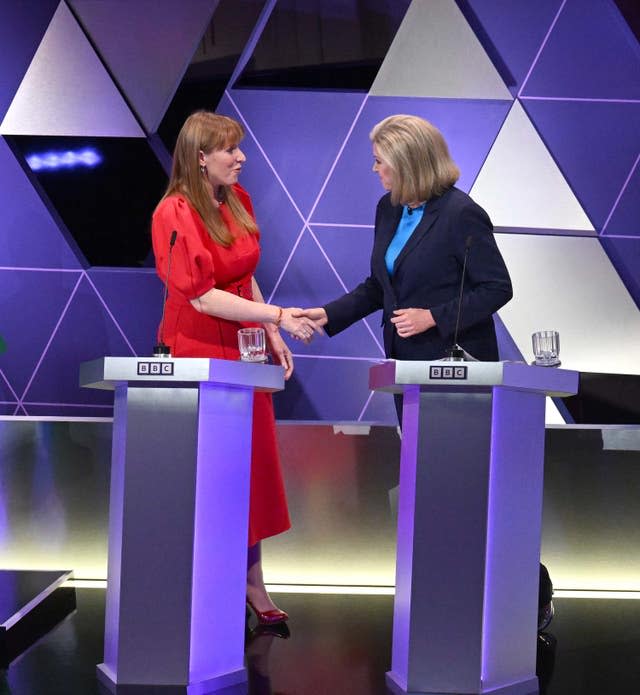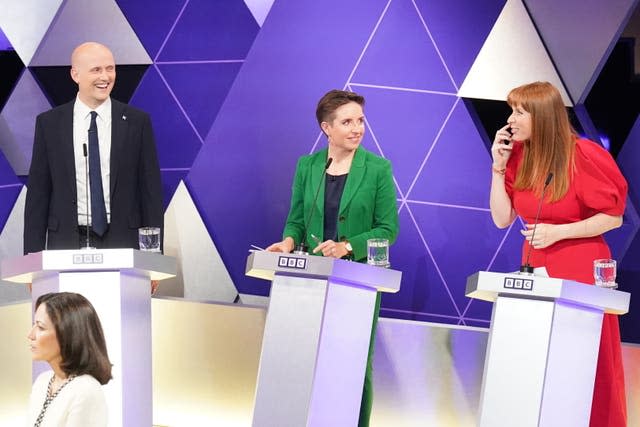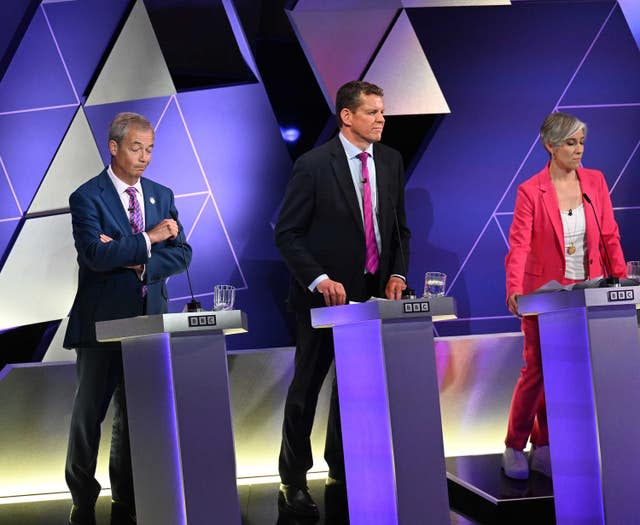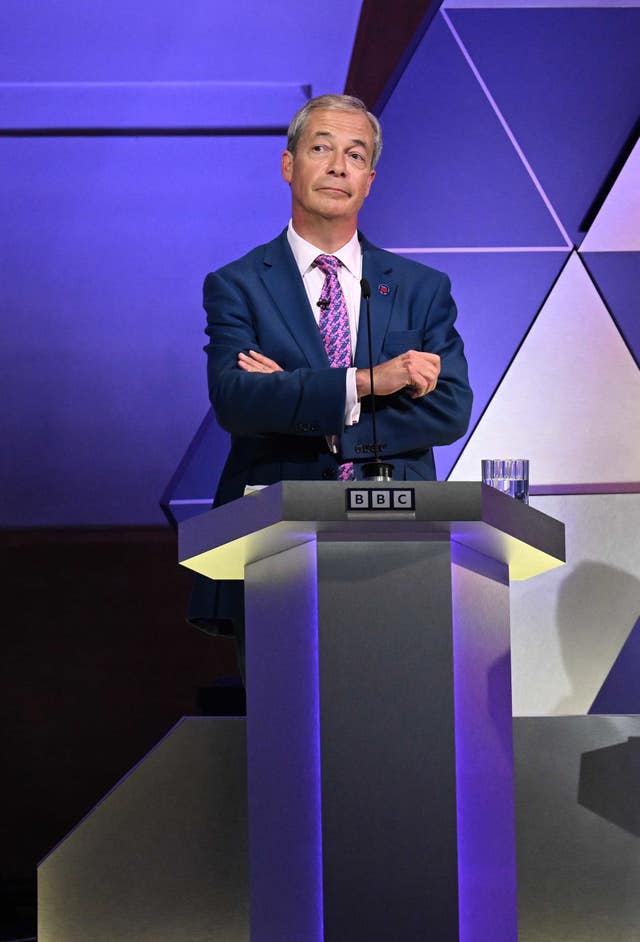Key moments from the BBC’s seven-way General Election debate
Seven senior political party figures have clashed in this General Election campaign’s first multi-party debate.
BBC One’s line-up featured Penny Mordaunt, the Conservatives’ Leader of the House of Commons, Labour deputy leader Angela Rayner, Liberal Democrat deputy leader Daisy Cooper, SNP Westminster leader Stephen Flynn, Plaid Cymru’s Rhun ap Iorwerth, Green Party co-leader Carla Denyer and Reform UK’s Nigel Farage.
They clashed over D-Day and support for war veterans, immigration and the state of the NHS.
Here, the PA news agency looks at some of the key moments from Friday night’s debate.
– D-Day row rumbles on
It all started with the row over the Prime Minister’s decision to leave D-Day commemorations early on Thursday.

Penny Mordaunt said Rishi Sunak’s call was “completely wrong” and added: “I’m from Portsmouth, I have also been defence secretary and my wish is, at the end of this week, is that all of our veterans feel completely treasured.”
The former defence secretary said the issue should not become “a political football” but Reform UK’s Nigel Farage, who went to Normandy himself, replied: “It already is, because the veterans themselves are speaking out saying he’s let the country down.”
– First applause goes to SNP…
…on the much-trodden debate over tuition fees, which are capped for Scottish students who want to study there at £1,820 in the 2023/24 academic year, compared with £9,250 in England and Wales. For most Scottish undergraduates, the £1,820 “home fee” is paid by the Student Awards Agency Scotland.
A medical student asked the candidates how they can ensure that she will graduate into a functioning NHS.

Mr Flynn said: “Given that you’re going to university to study medicine I think it’s also important to remind everyone in this audience the difference between the SNP and the Westminster parties. In an SNP-controlled Scotland you would not pay a single penny in tuition fees for your studies, what a difference that would make.”
– Candidates re-tread budget lines
“Labour’s plans to tax your future pension, senior nurses and doctors, is going to get healthcare professionals to leave the service. That is going to lead to more waiting lists,” Ms Mordaunt said.
“Penny, that’s rubbish and you’ve just said we need a strong economy – you backed Liz Truss and crashed our economy,” Labour deputy leader Angela Rayner replied.
Ms Mordaunt added: “Angela Rayner’s party – Keir Starmer confirmed this earlier this week – they are going to put up your taxes by £2,000 per working household.”
The controversial figure has made headlines, with the Labour leader accusing Mr Sunak of lying about how the sum was calculated, and Ms Rayner also branded the allegation “a lie” during the debate.
– Nigel Farage claims it was “one vs six” over immigration
Reform UK leader Nigel Farage claimed he was “on a platform tonight with six other people whose parties have been wholly unconcerned” with immigration.
SNP Westminster leader Mr Flynn said voters had been “led down the garden path by the right wing in British politics for far too long. We need to stand against it, we need to promote our economy, promote our public services, and do so by promoting migration”.
However, Reform UK leader and Clacton candidate Mr Farage said he wanted to inject some “logic” into the discussion, to which Mr Flynn replied: “That would be a novelty for you.”
– Claims of ‘giant’ energy bills
A green economic boost would “create jobs, well-paid jobs, distributed all over the country”, said Green Party co-leader Carla Denyer.

Addressing the cost-of-living crisis, Ms Denyer called for a “nationwide home insulation programme which would bring down everyone’s bills, help with the cost-of-living in the here and now and give us warm and more comfortable homes, create hundreds of thousands of green jobs and support local businesses”.
But Labour’s plan for a publicly owned renewables firm called Great British Energy – or GB Energy for short – was mocked by Ms Mordaunt from the Conservative Party.
“Do you know what the GB stands for? It stands for giant bills, and more bills are coming with the net zero plans that Labour have.”
– Lib Dem accuse Government of law-breaking, lying and economic illiteracy
Liberal Democrat deputy leader Daisy Cooper said: “This Parliament has been characterised by law-breaking, by lying and by the economic illiteracy of the mini-budget, and of all the things the Conservatives (have done), the worst thing that I think they have broken is people’s hope.”
BBC debate host Mishal Hussain responded “do you remember going back on the tuition fees pledge?” which prompted laughter from Mr Farage.
Ms Cooper replied: “That’s a sore subject for us, for sure, that was a very difficult decision.”
– Invitation to shoplift
“You can go shoplifting now, any of you,” Mr Farage told BBC audiences as he advocated for more stop and search powers while answering a question about crime allegedly rising in England and Wales by 8% since 2019.

He said: “You can go out and nick up to 200 quid’s worth without being prosecuted. We are seeing a decline, a societal decline of law and order in this country and frankly Government and the police forces are being too scared of what needs to be done.”
Mr Farage later urged voters to “join the revolt” in his closing statement.
From the Green Party, Ms Denyer called for investment into youth centres while Liberal Democrat deputy leader Ms Cooper said: “We need to get back to good old fashioned community policing, where the police know their communities, where the communities know their police, where community groups, where faith groups, where local families all work together and they get their intelligence from the ground up.”

 Yahoo News
Yahoo News 
